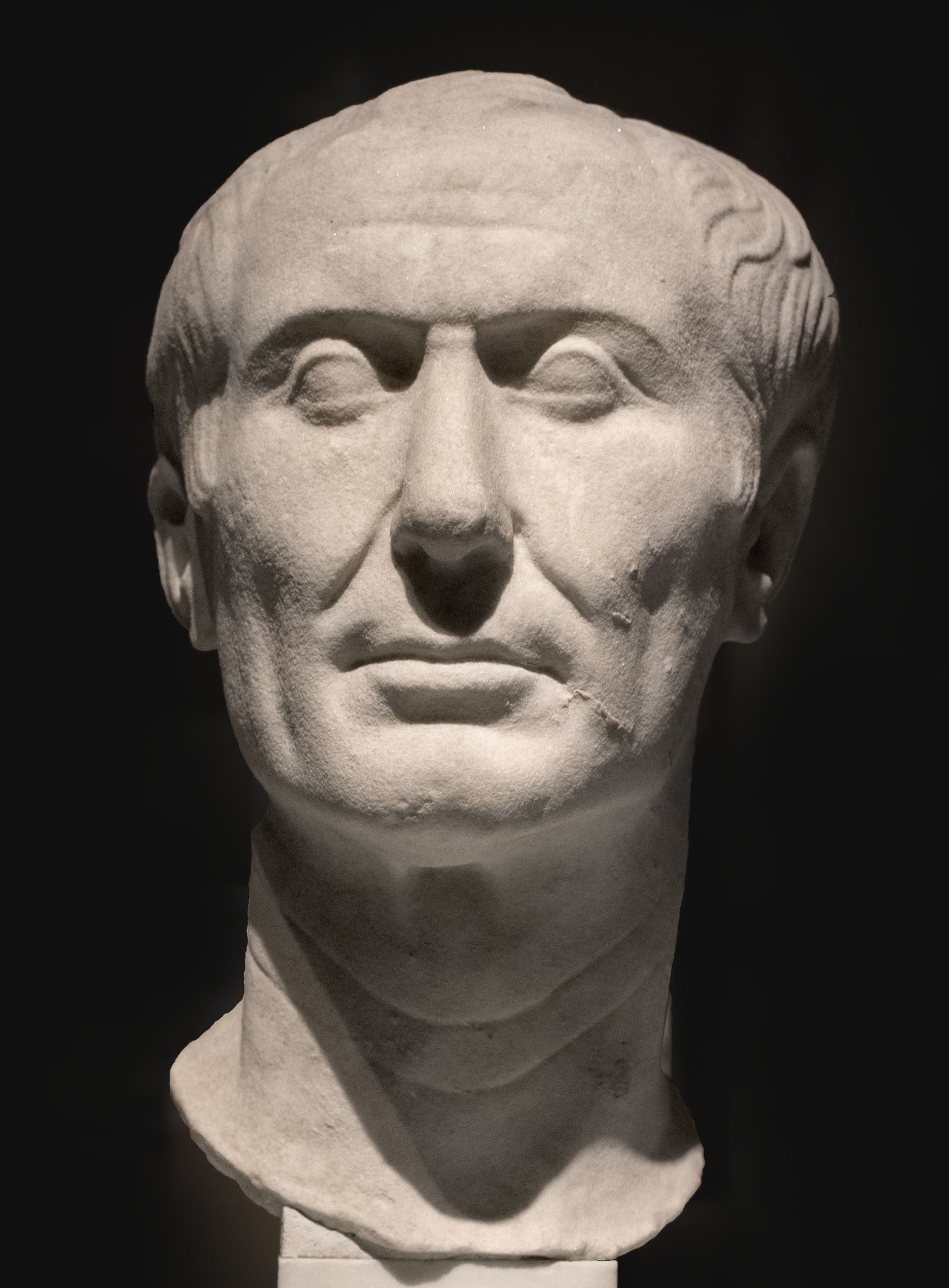More languages
More actions
m (Applied stub template.) Tag: Visual edit |
No edit summary Tag: Visual edit |
||
| Line 1: | Line 1: | ||
{{Infobox politician|name=Julius Caesar|birth_date=12 July 100 BCE|birth_place=Rome, [[Roman Republic]]|death_date=Rome, Roman Republic|nationality=Roman|image=Julius Caesar.png|image_size=200}} | {{Infobox politician|name=Julius Caesar|birth_date=12 July 100 BCE|birth_place=Rome, [[Roman Republic]]|death_date=15 March 44 BCE|death_place=Rome, Roman Republic|nationality=Roman|image=Julius Caesar.png|image_size=200}}'''Gaius Julius Caesar''' (12 July 100 BCE – 15 March 44 BCE) was a Roman general and politician. He was the nephew of the [[Populism|populist]] politician [[Gaius Marius]].<ref name=":0" /> | ||
'' | == Early life == | ||
Caesar was born in 100 BCE in a noble family. In 82 BCE, [[Sulla]] ordered Caesar's arrest after he refused to side with his [[reactionary]] movement. Caesar stayed out of Rome until Sulla's death in 78 BCE.<ref name=":0">{{Citation|author=[[Michael Parenti]]|year=2003|title=The Assassination of Julius Caesar: A People's History of Ancient Rome|chapter=The Face of Caesar|page=113–120|pdf=https://ipfs.io/ipfs/bafykbzacebkgquxzdwnl2ungksqnxoj4en3ux55j27wmhe6ckvycfhujidg24?filename=%28New%20Press%20People%27s%20History%29%20Michael%20Parenti%20-%20The%20Assassination%20of%20Julius%20Caesar_%20A%20People%27s%20History%20of%20Ancient%20Rome-New%20Press%2C%20The%20%282003%29.pdf|publisher=The New Press|isbn=9781565847972|lg=https://libgen.rs/book/index.php?md5=5F779507A3C668FF64DCFD058F66EBAC}}</ref> | |||
== | == Political career == | ||
Caesar | In 73 BCE, Caesar supported a measure allowing the return of anti-Sulla exiles and reversed decrees limiting the power of people's tribunes. As an aedile in 65 BCE, he used the money of the wealthy to organize very extravagant festivals. He became a candidate for high priest, a lifetime position, in 64 BCE. He won the position in a campaign against two older senators. He soon helped create a moderate land reform bill to benefit the landless poor and army veterans. | ||
Caesar was elected praetor (military official) in 62 BCE and proconsul of Farther Spain, where he successfully fought against the Lusitanians. During these years, he created political alliances with [[Pompey]] and [[Crassus]].<ref name=":0" /> | |||
== References == | == References == | ||
[[Category:Politicians]] | [[Category:Politicians]] | ||
[[Category:Stubs]] | [[Category:Stubs]] | ||
<references /> | |||
[[Category:Victims of assassination]] | |||
Revision as of 23:14, 2 January 2023
Julius Caesar | |
|---|---|
 | |
| Born | 12 July 100 BCE Rome, Roman Republic |
| Died | 15 March 44 BCE Rome, Roman Republic |
| Nationality | Roman |
Gaius Julius Caesar (12 July 100 BCE – 15 March 44 BCE) was a Roman general and politician. He was the nephew of the populist politician Gaius Marius.[1]
Early life
Caesar was born in 100 BCE in a noble family. In 82 BCE, Sulla ordered Caesar's arrest after he refused to side with his reactionary movement. Caesar stayed out of Rome until Sulla's death in 78 BCE.[1]
Political career
In 73 BCE, Caesar supported a measure allowing the return of anti-Sulla exiles and reversed decrees limiting the power of people's tribunes. As an aedile in 65 BCE, he used the money of the wealthy to organize very extravagant festivals. He became a candidate for high priest, a lifetime position, in 64 BCE. He won the position in a campaign against two older senators. He soon helped create a moderate land reform bill to benefit the landless poor and army veterans.
Caesar was elected praetor (military official) in 62 BCE and proconsul of Farther Spain, where he successfully fought against the Lusitanians. During these years, he created political alliances with Pompey and Crassus.[1]
References
- ↑ 1.0 1.1 1.2 Michael Parenti (2003). The Assassination of Julius Caesar: A People's History of Ancient Rome: 'The Face of Caesar' (pp. 113–120). [PDF] The New Press. ISBN 9781565847972 [LG]
